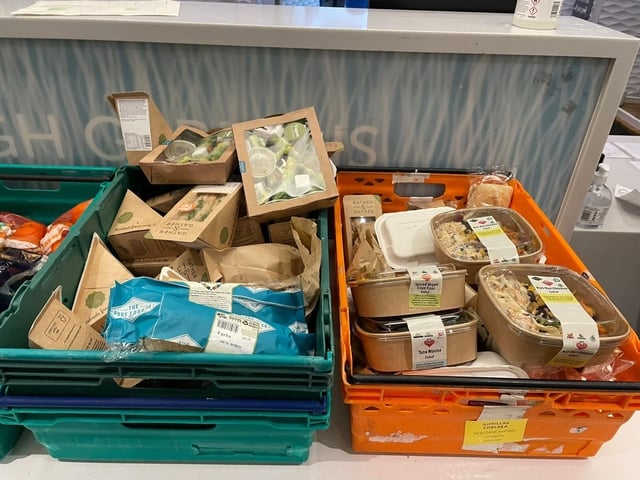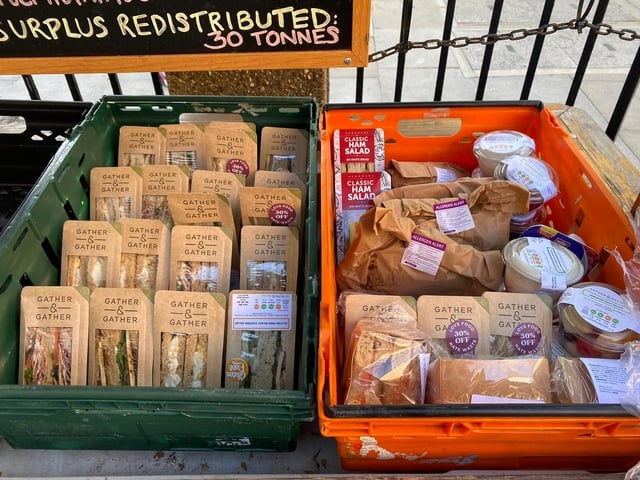We had a conversation with Farrah from the Lifeafterhummus Community Benefit Society. They have been working with the Student-Led Project Zero Food Waste to reduce food waste on the UCL campus. Farrah shares their experience collaborating with UCL students and has very insightful ideas and comments about the impact and the future of this project.
Can you say a little bit about your organisation?
At Lifeafterhummus Community Benefit Society we currently operate a model of a social supermarket, reuse centre, and redistribution network. In essence, we have about 50 local volunteers who go out and collect surplus food that is still fine to be eaten but is not being sold for different reasons.
The volunteers go to 45 stores, collect that surplus, and bring it back to be sorted at our centre. Once it’s checked, the surplus is redistributed to 80 local homes, 11 hostels, one after school club and one faith group.
Often the food that we are redistributing is food that could still be sold if supermarkets and stores were to address issues surrounding lack of storage. We redistribute 5 tonnes worth of surplus food per month with no financial contribution from the stores that we collect from. This would cost them money if they were to redistribute it themselves or if they were to waste the food. You could say we are operating a free waste disposal service.
I believe that the redistribution of surplus food should not be seen as charitable.
There is a lack of policy in place to make sure that food does not go unnecessarily to waste. Plus, it is a climate challenge issue. Imagine 5 tonnes worth of food that if it did go to waste, it would go with all its packaging into general waste that would then be releasing methane, as opposed to being separated from the food, where it would then release carbon dioxide.
What about your work with the UCL Student-Led Project Zero Food Waste? Can you explain a little bit about how this collaboration works?
Daisy, the project leader for Zero Food Waste, approached us last year to see if we could support them and help them get their partnership in place with the UCL Cafes and CH&CO. Zero Food Waste needed to have in place appropriate paperwork to show that students were addressing risk and food compliance, to make it possible for them to collect the waste and redistribute it. To show that they were monitoring the food as it was being picked up, and that they were checking that the organisations were the food would go to would also have the appropriate paperwork in place, such as public liability insurance, food hygiene and safety processes, food registration with the Council’s environmental health department, etc.
Our job was to support Zero Food Waste and help them navigate that process.
We were happy to do it, happy to support the students that have a wonderful vision, that food should not go to waste and to help them understand the processes behind it.
Because very often it can be seen as simple as collecting food that's going to waste and giving it to people that need it. But the reality is it's a lot more complicated and you must have all the right risk assessments in place. You cannot just take food from one partner and give it to another partner. The partner who's given the food wants to know, should somebody have an allergic reaction or food poisoning, that it doesn't fall on them.
Over six months we helped them navigate that process to get it all into place. I think the students did a wonderful job, they stayed consistent at it, they understood and learnt from us the method and what it takes to put this these partnerships in place, and they were very patient with the process of going backwards and forwards and backwards and forwards.
Why did your organisations decide to support this Student-Led Project?
Because I could see the students wanted to achieve this, I could see that desire; and regardless of what the motivation is, whether they're doing it because of the food waste or because it looks good as an extracurricular activity on their CV, regardless of any of that, they wanted to achieve something that would benefit others, and we wanted to help bridge that gap.
I think UCL can sometimes be very distant from the local community, and we wanted to help them foster closer ties with the community. It's important for students who are guests in our area to understand that the University campus is located in multi deprived areas. Students often only see Bloomsbury and think, “wow, this is a very rich area”, when Camden actually has quite a few multi deprived areas in the vicinity of the University.
I also think the University can do better at reaching out and forming those ties, so if we can take the time to support students to understand the area better then we're happy to do that.
What impact do you think this Student-Led Project has on the community or the partner organisations they work with?
I think that Daisy and her fellow students have put in place a project that will now be consistent and have a legacy to continue. There's always a difficulty when a project is passed on from one set of students to new student leads, but I think they've put in place the right systems now to ensure that this project will not fail as long as particular yearly checks are done, for example, checks on insurance, on food hygiene, etc.
I think they've put in place the groundwork to ensure that when new students takeover the project they will be able to keep it running and it will continue to support the hostels that they redistribute to and when there is too much for the hostels that food will continue to come to us, so that we can give it to the local community.
What advice would you give to another organisation considering whether to host one of our Student-Led Projects?
I would say to not let the students shy away from how difficult the situation is for local residents at present and to be very direct. As a local volunteer community sector partner, you are the best placed to understand what support you need or what support you can give, whether to the University or to local residents.
Community organisations have a lot to teach to students and to the University, so make sure they are listening and responding, and help them see the reality of their community.
If your school or organisation is interested in partnering with one of our Student-Led Projects? Find out more information here!

